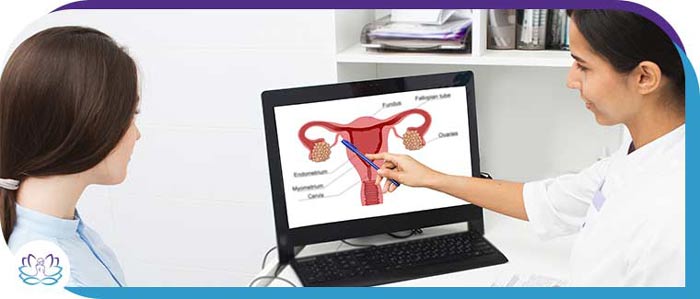Best Endometriosis Doctors in Chicago, IL
If you believe you have endometriosis, trust your health care with the medical professionals at Michelle Trandai MD in Chicago, IL. Our experienced and specialized staff provides incredible care and compassion. For more information, call us today or visit us online to book an appointment.


Table of Contents:
What is the treatment for endometriosis?
What are the risk factors in endometriosis?
How do you diagnose endometriosis?
What can be the complications of endometriosis?
Treatment is available for endometriosis. Treatments will depend on the approach you and your doctor choose depending on the severity of your endometriosis, as well as the signs and symptoms you are dealing with, or if you are hoping to become pregnant in the future.
1. Pain medication
Depending on the severity of your endometriosis diagnosis, your doctor may recommend over-the-counter medication such as pain reliever to help ease the painful menstrual cramps many deal with when suffering from endometriosis.
2. Hormone therapy
Hormone therapy can be effective in reducing or eliminating the pain of endometriosis. The hormones will work to make the endometrial implants become thickened, break down and bleed. Which will slow the endometrial tissue growth and prevent new implants of endometrial tissue from growing.
This is not a permanent fix; you can still experience the return of your endometriosis symptoms after stopping hormone therapy.
3. Conservative surgery
If you have been diagnosed with endometriosis, and you are still wanting to try and conceive, conservative surgery is a great option. This surgery will remove the endometriosis implants while still preserving the uterus and ovaries which can increase your chances of success in becoming pregnant.
4. Fertility treatment
While endometriosis can cause infertility issues, your doctor may recommend fertility treatments supervised by a fertility specialist. Fertility treatments can range from stimulating the ovaries to creating more eggs in-vitro fertilization.
5. Hysterectomy with the removal of your ovaries
Surgery to remove your uterus and ovaries is one of the most effective treatments for endometriosis, but also the most severe. This treatment option is best for individuals who do not want to become pregnant or do not care if they cannot become pregnant. This option has severe long-term effects on your health, especially if you have the surgery before the age of 35, so the pros and cons need to be discussed in great detail with your doctor, so you can gather as much information as possible before you make your decision.
While any female is at risk of developing endometriosis who have begun to have periods, there are other risk factors associated that can increase your chances of developing endometriosis, which includes:
1. Family history
Family genetics have a risk associated with endometriosis. If you have a family member who has endometriosis, you are at a higher risk of developing it. (Focus on immediate family members such as mother, grandmother or sister)
2. Menstrual cycle characteristics
The more you are exposed to menstruation, the higher of a chance you have of developing endometriosis. These factors that can increase the risk include:
– Having 27 days or less in between each period
– Starting your first period before the age of 12
– Experiencing periods that are lasting longer than seven days each month
3. Any conditions that may interfere with your regular menstrual flow
There is a theory that retrograde menstrual cycles are also associated with endometriosis, which is the flow that moves backward. If you have this medical condition, it can increase, block or even re-direct your menstrual flow, this could be a risk factor that could:
– Increase your estrogen production
– Produce uterine growths
– Increase structural abnormalities in your uterus, cervix, or vagina
– Create obstructions in your cervix or vagina
– Start asynchronous uterine contractions
4. Immune system disorders
Many immune system disorders can contribute to endometriosis risks. If you have a weak immune system, it is less likely that it will recognize that the endometrial tissue has been misplaced. The scattered endometrial tissue is then left to implant in the wrong areas.
5. Abdominal surgery
Sometimes, when abdominal surgery is done on a female, the doctor may unknowingly misplace the endometrial tissue, which can lead to endometriosis.
6. Age
Any female that is old enough to menstruate (start their period) is old enough to develop the condition of endometriosis. However, it is most commonly found that women are diagnosed with endometriosis are in their 20s or 30s.
Endometriosis can cause pain leveling from mild to quite severe, as well as other uncomfortable symptoms, especially during your menstrual cycle. To diagnose endometriosis, or any other related condition that can cause pelvic pain, Michelle Trandai MD will ask you multiple questions pertaining to the symptoms you are experiencing, as well as the location of the pain you are experiencing, and when exactly it is occurring.
She will also ask to run a few exams to see if there are any physical clues of endometriosis before diagnosing your symptoms, these tests include:
Pelvic exam
During your pelvic exam, the doctor will examine your pelvis for any abnormalities including cysts or scars on your reproductive organs or behind your uterus.
Ultrasound
Ultrasounds use high-frequency sound waves to create an image of the inside of your body. They are able to capture images by pressing a device to your abdomen or inserting it through your vagina. A standard ultrasound can show your doctor whether you have cysts that are commonly associated with endometriosis.
MRI
Magnetic resonance imaging is an exam that uses a magnetic field and radio waves to provide a detailed image of your organs and tissues within your body, this will provide better insight into the details of your symptoms, including the location and size of the endometrial implants.
Laparoscopy
A laparoscopy is rare, but in some cases, your doctor may refer that you get a procedure completed that allows the surgeon to view the inside of your abdomen. You will be under general anesthesia as your surgeon makes a tiny incision near the navel and inserts a small camera instrument to look for signs of endometrial tissue that is located outside of the uterus. This procedure will provide more information about the location, extent, and size of the endometrial tissue, as well as allow them to get a sample for further testing to confirm.
While endometriosis has treatment options available and can be managed through these treatments, there are still risks and complications when you are diagnosed with endometriosis, including issues with fertility. Infertility is one of the more serious complications associated with endometriosis. Women who suffer from milder stages of endometriosis may still be able to conceive and carry a baby to term, while a large portion of women who suffer from endometriosis have trouble conceiving or staying pregnant.
The medications offered to treat endometriosis do not help improve the ability to become fertile or get pregnant, while some can conceive once the endometrial tissue is surgically removed, most cannot. Another serious complication of endometriosis is chronic pain, which can be difficult to deal with let alone manage. Other complications that are known to flare up when an individual has endometriosis include depression, anxiety, and mental health issues.
Call us for more information. We serve patients from Chicago IL, Evanston IL, Ravenswood IL, Uptown IL, Lake View IL, Lincoln Park IL, Buena Park IL, Bowmanville IL, Boystown IL, and Roscoe Village, IL.






